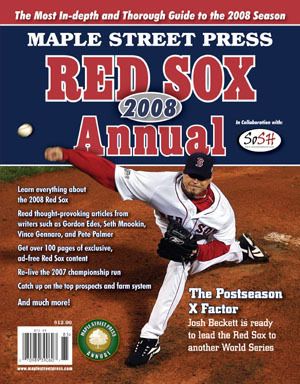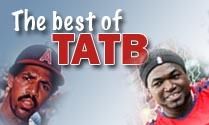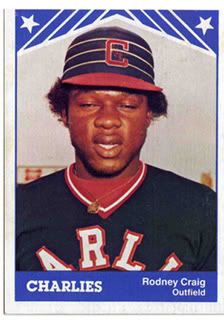Abstract art
If you are one of the Original 12 readers of this site, you might recall that back in TATB's fledgling days, I'd occasionally dig up and post player projections from one of Bill James's legendary Player Ratings books from the early '90s. It was a fun feature to pull together, one that brought a lot of feedback and reaction - and more often than not our flashback proved James prescient in his analysis. (Thought I'm not quite sure Phil Plantier turned out to be one of the great power hitters of the '90s, as James predicted. Hey, we all swing and miss sometimes . . . especially Plantier, as it turned out.)
Over time, I abandoned the feature, in part because my wife got tired of looking at the old books cluttering up the desk and chucked them in a closet, and in part because I pretty much had already posted pretty much all of James's humorous and insightful comments, at least regarding topics that would be relevant to readers today. While his comments on past Sox were always worthwhile, I don't think anyone checking out his site really gave a damn about what he said regarding, oh, Roger Pavlik 10 years ago, you know? So as much as I enjoyed finding them, I let the feature fade away. Yeah, kind of like Plantier.
Well, party on, Original 12, because I'm about to bring it back - or at least an altered version of it. I recently got a sweet deal on a bunch of James's seminal Baseball Abstracts from the '80s. (What did we ever do without Amazon.com?) As you might imagine, the books are packed with page after page of compelling stuff. While the format of the Abstracts is different from the Player Ratings books - here
Which brings us to Marc Sullivan. Sox fans will remember him as the original Thanks Dad, a decent-field/can't-hit-a-bleep catcher who for a brief time was the starting catcher thanks to two fortuitous breaks, one professional and one genetic:
• Rich Gedman, the incumbent catcher, was embroiled in a contract dispute.
• His father, Haywood Sullivan, was the Boston GM. Talk about friends in high places.
Now, I met Sullivan a few times when he was battling fellow immortal John Russell for the Maine Phillies' catching job in 1988, and as James notes in his essay on the Sox in his '88 Abstract, he was a nice guy. But a good personality doesn't make you a big leaguer - even Kevin Millar knows he has to produce or become a Yakult Swallow - and Sullivan, more than any other Red Sox I can think of, was absolutely unqualified to call Fenway his workplace. Hell, he was overmatched playing for a middling Triple A team a year after starting for the Sox. If his last name was Schwartz, his career likely would have stalled in Double A.
You think I'm being mean? Too blunt? Well, check out what James had to say in '88. I believe the word I'd use to describe this excerpt is "vicious" - though I suppose "accurate" also works:
I'm sorry if this is harsh, but there is nepotism here, and it offends me. The Red Sox in 1979 blew a second-round pick on Marc Sullivan, the son of then-vice president Haywood Sullivan. After young Marckie hit .203 with 1 home run in 117 games in the Eastern League (1982), the Red Sox had the effrontery to dress him up in a major-league uniform and foist him off as a major-league player in two games late the same season. After he went back to the minors and hit .229 and .204, they decided he was ready to play for the major-league team. In 1985 and 1986, as a part-timer, Sullivan hit .174 and .193. In 1987 he opened the season as the Red Sox' regular catcher. We should all find our opportunities so abundant.
What I would like to know is, where the hell does Haywood Sullivan get off trying to make his precious little boy an exception to the rules that the rest of the baseball world obeys? The most basic rule of sports is that in the effort to win, you put the team goals ahead of your personal agenda. The public posture of every major league team is that they expect their players not to play for their own statistics . . . but to do what the good of the team demands. They would be appalled if a player stated publicly that he was playing for himself first and didn't care much whether the Sox won or lost. But Haywood Sullivan wants to add, "Of course, that doesn't apply to me."
And where is the watchdog? What does the press say? They tell us that Marc Sullivan is such a nice kid. Well, who the hell cares if he's a nice kid. Do you have any idea how many nice kids there are in AAA ball? It is not fair to those kids to tell them that Marc Sullivan is playing by a different set of rules than they are. It is not fair to Red Sox fans, and it's not fair to other players.
I call on Peter Ueberroth to intervene and end this disgraceful situation . . . he should tell Haywood to get Marc Sullivan's sorry ass out a Red Sox uniform by sundown.
And this isn't the entire segment - I actually cut it short before James gets around to calling Daddy Sullivan "a half-a-man." Compelling stuff, huh? And people think he's just a numbers cruncher.
You know, come to think of it, I doubt James would have gotten a job in the Red Sox front office during the Sullivan regime. I have a hunch they might have clashed.
* * *
As for today's Completely Random Basketball Card:

As CBS's go-to college hoop analyst, Clark Kellogg comes across as affable enough, but insight is not his forte; he settles for dealing in cliches and generalities. He's not bad, mind you . . . it's just that he was much better at his first job. As the Indiana Pacers' go-to guy in the early-'80s, Kellogg was one hell of an underrated force (he averaged 20 and 10 as a rookie) before knee injuries ended his NBA days at age 25. Watching him now, successful if uninspiring in his second career, I wonder how many people remember him for the player he was, and the player he could have been.













|
<< Home